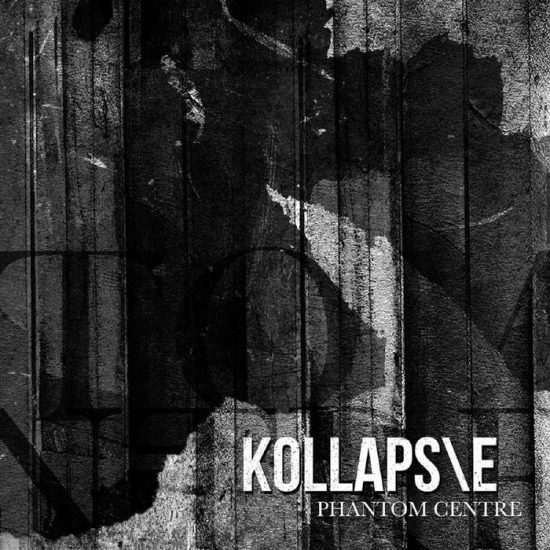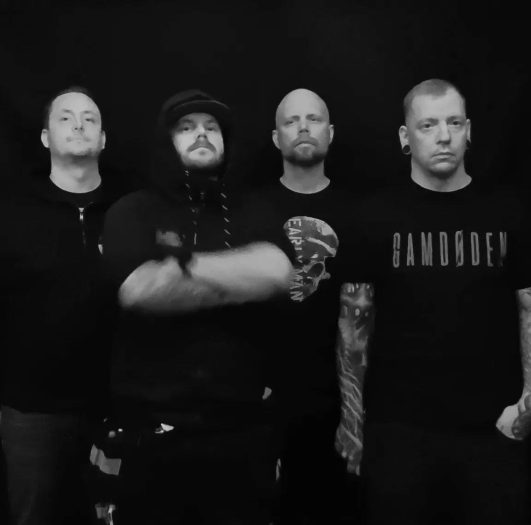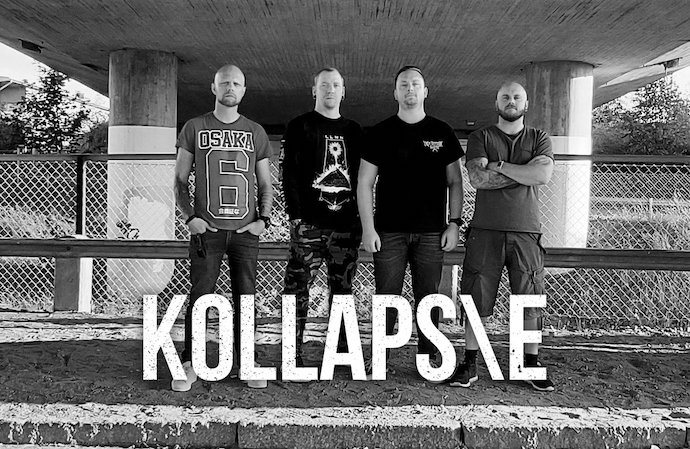
I almost never attempt to write album reviews except when we’re hosting full album premieres, and occasionally as part of the black metal column I put together on Sundays. It’s not for lack of desire, just a consequence of being squeezed for time after completing everything else I do around this joint. Doesn’t mean I don’t listen, just means I’m usually forced to keep my thoughts to myself.
And so what you’re about to read is a relative rarity for me, spawned not only by a belief that Phantom Centre, the new album by the Swedish post-metal/sludge band Kollaps\e, is deserving of whatever push I can give it, but also by an unexpected gift of free time.

Phantom Centre is out in the world now, but with a January 13th release date (via Trepanation Recordings) it hasn’t been out there for long. I’ve had it in my clutches for longer than that, and long enough to realize what a damned strong grip it has.
A few of the songs surfaced in the run-up to the release, including the striking first single, “Beautiful Desolate“. In some ways that song is a bulldozer strung with razor wire, surging forward with pounding, skull-cracking momentum, and wreathed in slashing and searing guitars and screamed vocals that are so intense as to raise the hackles on your neck. It is indeed desolate – a coil of tension, a cauldron of turmoil, and a pile-driver of punishment – but is it beautiful? In a way it is, as long as you find tragedy beautiful, because that’s what the ringing arpeggios, the fluid leads, and the soaring melodic cascades bring forth, the sounds of anguish and sorrow.
These kinds of contrasts and complements become hallmarks of the album as a whole. It’s that combination of visceral heavyweight punch, the penetrating ring and roil of bleak and bereft melodies, and the incinerating impact of the vocals that keeps the album’s grip fierce and tight. At the same time, the album is richly detailed, sometimes ornamented with elegant phrasings, and it twists and turns a lot before it lets go.
The album opener “Era“, for example, is creepy and noirish at first, but soon enough the band begin to slug, bray, and scald. The combination of sensations creates a feeling that’s both dreamlike and hostile. The skull-busting, muscle-moving grooves are damned potent, but the riffing is chimerical and more than a little unsettling. The vitriolic vocals are again as raw as a lacerated wound, but sounds of melancholy dreaminess and wailing despair also surface — along with punishing bleakness.
The band push and pull the intensity in “Era“, and so they make room for a head-moving interlude when a big bass hook and a big bass drum carve the line and let the guitars whine and clang in the distance, before the band stride into an especially cold and brutish finale, trailing a banner of quivering guitar melody that seems to plead for some sign of hope.

There are other moments when the music seems to plead for something like a life-preserver, or at least a gentle hand of comfort. Maybe that’s what you’ll hear in the quavering violin tones and magical guitar reverberations that bookend “Uhtceare“, or maybe that will sound to you like the haunting of spirits beyond the veil, a different kind of beauty within the desolation. Even as the bass emits a ragged pulse, that song becomes panoramic. It also rumbles the earth into rubble and towers in its colossal and catastrophic immensity. That song has no vocals, and needs none to make it probably the most dramatic and soul-shaking song on the record. And for sure, there’s tragedy again in the piercing guitar melody that fights through the devastation.
All the remaining songs are shorter than the “Uhtceare” saga, but make their own stunning impacts. “Anaemia” is a fine example of the way Kollaps\e layer sounds and sensations, and create details that are both inviting and unnerving as they send hearts soaring in need, or collapsing under the pressure of one punishment after another, while the shimmer and flicker of “Brant Barn Skyr Elden” creates an uneasy sonic dreamscape, but not exactly a chance to take deep breaths because the dream is too chilling – and because the band eventually bend their energies toward the infliction of pavement-cracking ruination and emotional mangling (all of which is electrifying, to be sure, and again brings feverish strings into the fold).
The riffing and the shrill, squirming leads in “Radiant / Static” will put your teeth on edge with their dissonant, seething, tension-filled sounds — and yet there is indeed a kind of magnificent radiance that shines through as well. And finally, the tumbling, booming drumwork and scratchy bass torture at the outset of “Murrain” keeps the band’s teeth in your neck, and as the song slugs and slithers, whines and blares, it becomes more and more fearsome. There’s a frightening, hallucinatory interlude before a further dose of pile-driving brutality, and then an utterly deranged crescendo that threatens to overwhelm the senses. What a way to end an album.
I suppose a summing-up might be expected after all those track-by-track impressions, which I hope didn’t become too tedious. So here you go:
There’s a line in one of Cormac McCarthy‘s two most recent novels where a doomed principal character explains with utter assurance: “The world has created no living thing it does not intend to destroy.” And there is a line in the other novel which describes taking off over Mexico City: “[T]he plane lifted up through the blue dusk into sunlight again and banked over the city and the moon dropped down the glass of the cabin like a coin falling through the sea. . . . Far below the shape of the city in its deep mauve grids like a vast motherboard.”
https://kollapsemusic.bandcamp.com/album/phantom-centre
https://www.facebook.com/kollapsemusik/
https://instagram.com/kollapse_music
